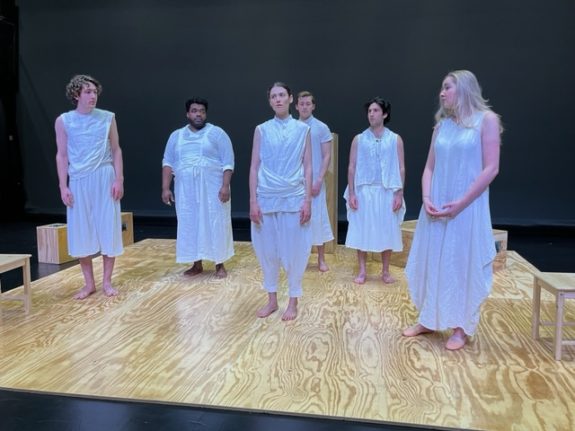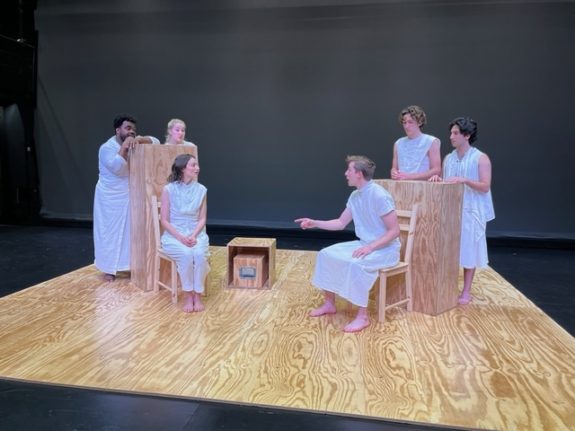On Saturday, October 15, Events Editor Ava Slocum attended the Lenfest Center for the Arts’s production of Orlando, Sarah Ruhl’s theatrical adaptation of the Virginia Woolf novel. The Lenfest Center’s production was an MFA acting thesis, featuring six members of Columbia School of the Arts’s 2023 graduating class.
Since its publication in 1928, Virginia Woolf’s Orlando: A Biography has become famous in the contexts of both literature and gender studies for its portrayal of a character who shifts across gender and temporal boundaries, living through centuries of European history as both a woman and a man. The Lenfest Center’s production–and the six MFA acting students who performed–captured the depth, ambiguity, and delights of the novel, while showcasing the talents of the Columbia School of the Arts’s 2023 graduating cohort.
Playwright Sarah Ruhl is no stranger to adaptation. Some of her early plays were inspired by those of Chekhov, and last year the Met premiered an operatic version of her play Eurydice, based on Greek mythology. Her adaptation of Orlando pays homage to the original narrative form as characters often speak in the third person and quote directly from the book, while director Jimmy Maize’s focus on the actors’ physicality and dance-like movement around the stage ensure that the adaptation makes for a theatrical spectacle.
Like Woolf’s novel, the play Orlando begins in Elizabethan England. Orlando is a young teenager who gets a job as a page in Queen Elizabeth’s court. His dream in life is to write, and he begins a long, ornate (though not very good) poem called “The Oak Tree” that he continues to labor over for the rest of the play.
Maize’s production explores questions of gender fluidity from the very beginning, with men actors playing Orlando’s many women admirers in the Elizabethan court. Only one performer, Hannah Shealy, played the role of Orlando for the whole show; the rest of the actors shifted back and forth between different characters of all gender identities throughout the play.
While still in the queen’s court, Orlando falls in love with the beautiful and spunky Russian princess Sasha (played with hilarious vivacity by Charlotte Francis). After the Great Frost of 1608, Sasha and Orlando skate away together to London along the frozen Thames, only to run into the ship of the Russian embassy stuck in the ice. When the Frost ends and the Thames thaws, Sasha sails away with them back home to Russia, leaving behind a heartbroken and desolate Orlando. (The Russian sailors, on the other hand, are very fun and jolly, singing a jaunty song about the glories of the motherland… with the added line, “To be clear, this is Russia from a long time ago!”)
In London, Orlando is relentlessly pursued by the somewhat androgynous Romanian Archduchess Harriet, prompting him to request that King Charles II send him away as ambassador to Constantinople. (Charles II, by the way, became king in 1660—Ruhl subtly glosses over the first big time jump of Orlando’s near-immortal life). There in Constantinople, Orlando falls into a mysterious trance. When he finally wakes up six days later, he is… (drumroll please)… a woman!
The rest of the play follows the now-female Orlando’s return to England and life through the early twentieth century, simultaneously downplaying Orlando’s sudden unexplained gender shift and using it to explore questions of gender roles across the eons.
On the sea voyage back to London, Orlando is forced to confront the realities of her new sex as she imagines her long, heavy skirts pulling her down and drowning her should she fall off the boat and into the ocean. Meanwhile, the patronizing ship’s captain won’t stop hitting on her, making her reflect that “up till this moment, she’d never given her sex a thought” while she was still a man.
Back in England, Orlando continues to be met with “the privileges and penalties of her condition.” As a woman, she cannot inherit property, putting her claim on her ancestral home on thin ice. The now-male Archduke Harry of Romania—who has apparently been secretly a man this whole time—reappears and refuses to be discouraged now that Orlando is a beautiful woman. In the novel, Woolf—who lived as an openly bisexual woman in the early twentieth century—also brings questions of sexuality into the mix as Orlando reflects on her lost love Princess Sasha: “Even though [Orlando] was a woman, it was still a woman she loved.”
Soon, the seventeenth century bleeds into the eighteenth, then the nineteenth, then the twentieth. (As in the novel, Orlando’s immortality is never explained beyond the mere fact that “she, who believed in no immortality, could not help feeling that she would come and go forever.”) In all this time, Orlando has been lonely, drifting by herself through the centuries. In the Victorian Age with its rigid social structures, Orlando decides that “the only thing left to do” is to “submit to the spirit of the age and take a husband.” But she is surprised when she actually falls in love with Marmaduke Bonthrop Shelmerdine, a sea captain who, like Orlando, is gender non-conforming. In one of the production’s most touching moments, Orlando and Marmaduke meet, hug, and kiss in the first physical contact of the play—up until now, all the touching had been mimed. During the traditional Victorian marriage ceremony, a rainstorm and loud thunder outside cover up the sound of their vows, so that no one audibly says the word “obey” or hears a ring pass from hand to hand (to Orlando, a wedding ring is a symbol of ownership).
The staging itself hinted at the themes of fluidity and ambiguity that the show embodies. All six cast members wore white, flowy robes that emphasized their choreographed movements. With no set aside from a few wooden boxes and chairs that became a table, a room, a ship, and more as the show went on, the actors mimed other parts of the plot, like the oak tree about which Orlando tries to write a poem. The minimalism of the set and costumes served to emphasize the beauty of the words the actors spoke, and the lovely images that Woolf and Ruhl’s writing create made for more than enough of a sensory experience. Meanwhile, the house lights stayed on for the entire show, inviting the audience to live as part of the rich century-spanning world that the actors were inhabiting.
The play and the novel both end with Orlando stepping into the early twentieth century (the book ends on October 11, 1928, the day that Orlando: A Biography was first published). This production—in its one departure from sheer minimalism—ended with a two-minute screen projection of flashing lights, images, and sounds from across several decades when Orlando, having driven her new car to a London department store, is suddenly overcome with memories of her immortal life. Finally, after four centuries of traveling through Europe and living as a man and a woman, Orlando is able to finish her poem “The Oak Tree” with a feeling of joyous completion.
This production of Orlando also represents the end of an era for the six actors who are nearing the end of their time in Columbia’s MFA program. In their program note, Peter J. Fernandez and James Calleri, the Co-Heads of Acting, commend the work that these actors have done and the “full sense of self that they have labored to uncover and cultivate over the last three years.” Their lovely rendition of Orlando signals the end of a formative chapter; however, like Orlando themself, it “represents a very short time in these young artists’” creative journeys.
The MFA Acting Thesis production of Orlando featured 2023 program graduates Hannah Shealy, Charlotte Francis, George S. Copeland, Sina Pooresmaeil, Nick Saxton, and Josh C. Thomas as Orlando, Sasha, and the four members of the chorus. Another MFA production of Stephen Adly Guirgis’s Halfway Bitches Go Straight to Heaven will run from November 3 through 6.
Orlando poster via the Lenfest Center
Actors via Ava Slocum


 0 Comments
0 Comments

